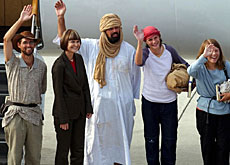Questions remain over Sahara hostages

A year ago four Swiss citizens were kidnapped in the Sahara desert and held hostage for almost six months before being set free.
While the exact details of their release remain unclear, last year’s kidnappings in Algeria have prompted travel insurers to review their policy on abductions.
At the time it was widely reported that a ransom of up to €5 million (SFr8 million) had been paid to secure the release of the nine Germans, four Swiss and one Dutch national.
The German and Swiss governments continue to maintain that no money changed hands despite statements to the contrary from the Algerian authorities.
No one knows how much the rescue and return of the hostages from the West African state of Mali really cost. All those involved in the operation have agreed to keep quiet about it.
The only concrete figure available is SFr65,500. That’s how much Swiss travel insurers agreed to pay following negotiations between the travel industry ombudsman, the four kidnapped Swiss, their insurance companies and the foreign ministry.
And while the German hostages had to bear some of the costs of their rescue, the Swiss haven’t had to pay anything.
“People weren’t happy about that,” ombudsman Nicolas Oetterli told swissinfo. “There was a strong feeling that the hostages had got off too lightly.”
“I’m of the opinion that a personal contribution – within their financial means – would have been reasonable. I’m really quite surprised that the foreign ministry has been so generous.”
Going it alone
Unlike holidaymakers on package tours, it’s up to independent travellers to assess the risks of a particular destination themselves.
“We take a lot of trouble to remind our clients of their responsibilities,” said André Lüthi of Globetrotter Travel Service, Switzerland’s biggest agency for independent travel tours.
Up to now the costs associated with the return of abducted tourists have been borne by the travel insurance companies. But the Sahara experience has led to a review of this policy.
At least one leading Swiss travel insurer, Europäische Reiseversicherung, is considering excluding kidnap cover from 2005.
“The Sahara kidnappings have made us rethink our policy,” said chief executive Thomas Tanner.
Oetterli says he is not surprised that insurers are cutting back on their exposure to risk, given the increase in adventure travel.
No-go zones
The travel industry relies on the foreign ministry’s advisory list as a guide to where it is safe to go on holiday.
“That means that if someone travels to a country on the risk list, then the costs of an emergency return journey or repatriation are not covered by us,” said Tanner.
Globetrotter’s André Lüthi says staff are told to scrutinise the foreign ministry’s list daily.
All this would seem to place a great deal of responsibility at the door of the foreign ministry, leading to unease among officials, according to Oetterli.
“It’s clear the ministry is not comfortable with the way the travel industry uses the advisory as a basis for doing business,” he said.
Foreign ministry spokesman Alessandro Delprete agrees.
“The problem is that the foreign ministry cannot be responsible for agreements made between travellers and insurance companies,” he said.
swissinfo, Christian Raaflaub
February 22/23: Last contact with 11 tourists in southern Algeria – six German, four Swiss and one Dutch national.
March 17: A second and third group of tourists are reported missing.
March 30: A fourth group consisting of five Germans and one Swede is reported missing.
April 2: Four more German tourists disappear.
April 11: Two more Austrians go missing in the Sahara.
April 28: Clothing and other items belonging to the tourists are found.
May 4: Algeria confirms that the tourists are alive.
May 6: Authorities in Algeria deny negotiating the hostages’ release with the kidnappers.
May 7: Some 5,000 Algerian troops comb the Sahara in search of the missing tourists.
May 10: A Swiss foreign ministry official meets Algerian counterparts to press for more information.
May 13: 17 hostages – ten Austrians, six Germans and one Swede – are released.
August 18: The remaining 14 hostages are freed and head to the capital Bamako.
August 19-20: The tourists arrive in Bamako and are flown home.
One hostage – a 45-year-old German woman – died of heatstroke while in captivity and was buried by her captors.

In compliance with the JTI standards
More: SWI swissinfo.ch certified by the Journalism Trust Initiative











You can find an overview of ongoing debates with our journalists here . Please join us!
If you want to start a conversation about a topic raised in this article or want to report factual errors, email us at english@swissinfo.ch.